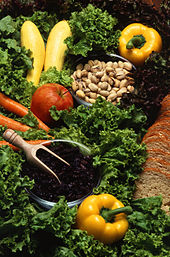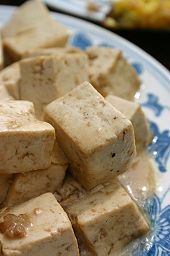Vegetarian nutrition

Vegetarian nutrition is the set of health-related challenges and advantages of vegetarian diets.
Appropriately planned vegetarian diets are healthful and nutritionally adequate for all stages of the human life cycle, including during pregnancy, lactation, infancy, childhood, and adolescence.[1] However, vegetarian diets deficient in vitamin B12 or calories may compromise children's health and development.[1][2] The UK National Health Service recommends that vegetarian diets should also follow the general recommendations for healthy diets, such as low fat, salt and sugar intakes and 5 fruits or vegetables a day.[3] Qatar's public health ministry states, "One cannot be a healthy vegetarian by going to a fast food restaurant and ordering french fries and soda!".[4]
Vegetarian diets tend to be rich in
Critical nutrients
Protein

Despite the long-standing, widespread belief that vegetarians must consume grains and beans within a short time to make a complete protein that contains all 9 essential amino acids that must be supplied through diet, this has never been substantiated by research. The protein-combining theory was brought to popular attention after being promoted in Frances Moore Lappé's 1971 bestselling book Diet for a Small Planet. In later editions of the book, starting in 1981, Lappé withdrew her contention that protein combining is necessary.[5]
Plant foods rich in protein include
Vitamin B12
Vitamin B12 deficiency can be extremely serious and lead to megaloblastic anemia, nerve degeneration and irreversible neurological damage.[7]
Vegetarians may get vitamin B12 from eggs and dairy products (milk, cheese, etc.);[8] for some, this is adequate, while others may still remain B12-deficient.[1] More broadly, according to the Academy of Nutrition and Dietetics, even the form of vitamin B12 sourced from animal products is protein-bound and not as easily digested as supplements, especially as people age, and therefore B12 supplementation is recommended for everyone over the age of 50.[1] Pregnant and lactating vegetarian mothers—and breastfed infants if the vegetarian mother's diet is not supplemented—should also use supplements, whether B12-pills, B12-injections, or B12-fortified foods, if they don't get adequate vitamin B12 from animal products like eggs or dairy.
Generally, humans need 2.4 to 3 micrograms of vitamin B12 each day.[8] There are cases to suggest that vegetarians and vegans who are not taking vitamin B12 supplements or food fortified with B12 do not consume sufficient servings of B12 and have abnormally low blood concentrations of vitamin B12.[9] This is because, unless fortified, plant foods do not contain reliable amounts of active vitamin B12.[1]
It is essential, therefore, that vegetarians consume adequate amounts of dietary supplements or foods that have been fortified with B12, such as vegetable stock, veggie burger mixes, textured vegetable protein, soy milks, vegetable and sunflower margarines, and breakfast cereals.[7] B12 used in these foods or supplements is typically grown from vegan sources (such as bacteria). Soybeans and barley seeds from plants grown in soils amended either with cow dung (which is rich in B12) or with pure B12 had a higher B12 content than those grown without this supplementation.[10]
Omega-3 fatty acids
Vegetarian diets can be low in
]A potential problem is that vegetarian diets lacking eggs or generous amounts of
A 2022 review found that microalgal oil supplementation is consistent in increasing DHA and EPA levels, whilst high dose flaxseed or echium seed oil supplements provide no increase despite significant increases in ALA levels.[12]
Calcium
In general, lacto-ovo-vegetarians have a relatively high intake of calcium that meet or exceed calcium recommendations.[13]
A 2022 review found no significant difference in calcium intake between vegetarians and omnivores.[14] Vegetarians can obtain calcium from dairy products, calcium-fortified plant milks, almonds, figs, oranges, calcium-set tofu as well as low-oxalate vegetables such as bok choy, kale and turnip greens.[13]
Compared with omnivores, vegetarians tend to have a lower bone mineral density (BMD) but not a higher fracture rate.[15][16]
Iron
Vegetarians are more likely to have lower iron stores compared with non-vegetarians and have a higher risk of iron deficiency anemia.[17][18][19] Lacto-ovo-vegetarians that overly rely on dairy consumption may lead to an elevated calcium intake which can affect iron absorption.[20]

The recommended iron intake for vegetarians is 180% that of nonvegetarians due to the bioavailability of non-heme iron.
Non-heme iron is more sensitive to both inhibitors and enhancers of iron absorption:
Iron is an integral part in the chemical structure of many proteins and enzymes, which maintain good health. In humans, iron is an essential component of proteins involved in the transport of oxygen of red blood cells. Iron also helps regulate cell growth and cellular differentiation.[23]
Zinc
A 2013 review found that zinc intake and serum zinc concentrations were significantly lower in populations that follow vegetarian diets compared with non-vegetarians.[24]
Iodine
One study reported a "potential danger of [iodine] (I) deficiency disorders due to
Health effects
Evidence suggests that vegetarian diets have beneficial effects on
See also
- Vegetarian cuisine
- Vegan nutrition
- The China–Cornell–Oxford Project in the 1980s
- The China Study done 2005
References
- ^ PMID 12778049.
- PMID 18709887.
- ^ "The vegetarian diet". nhs.uk. 27 April 2018. Retrieved 22 May 2021.
- ^ "Qatar Dietary Guidelines" (PDF). Qatar MOPH. 2015. p. 18.
- ISBN 978-0-345-32120-6.
- ISBN 978-1-4200-3683-1.
- ^ a b The Vegetarian Society. Information Sheet: Vitamin B12 Archived 22 August 2008 at the Wayback Machine. Retrieved 26 April 2007.
- ^ a b "Dietary Supplement Fact Sheet: Vitamin B12". USA.gov. Office of dietary supplements. Retrieved 14 March 2012.
- PMID 23356638.)
{{cite journal}}: CS1 maint: multiple names: authors list (link - S2CID 44300067.
- PMID 19500961.
- ^ S2CID 231899843.)
{{cite journal}}: CS1 maint: multiple names: authors list (link - ^ S2CID 4984228.
- S2CID 249441078.
- PMID 30376075.)
{{cite journal}}: CS1 maint: multiple names: authors list (link - S2CID 252405392.)
{{cite journal}}: CS1 maint: multiple names: authors list (link - PMID 30783404.)
{{cite journal}}: CS1 maint: multiple names: authors list (link - S2CID 25792199.)
{{cite journal}}: CS1 maint: multiple names: authors list (link - ^ S2CID 213892045.)
{{cite journal}}: CS1 maint: multiple names: authors list (link - ISBN 978-3-030-82515-7
- ^ "Iron: Food Fact Sheet". bda.uk.com. Retrieved 2 January 2023.
- ^ "Vegetarian and vegan diets". healthdirect.gov.au. Retrieved 2 January 2023.
- ISBN 9780849366772.
- S2CID 46474144.)
{{cite journal}}: CS1 maint: multiple names: authors list (link - PMID 10341675.
- PMID 26508743.)
{{cite journal}}: CS1 maint: multiple names: authors list (link - S2CID 251866952.)
{{cite journal}}: CS1 maint: multiple names: authors list (link - S2CID 225483653.)
{{cite journal}}: CS1 maint: multiple names: authors list (link
External links
- United States Department of Agriculture. Vegetarian Nutriton.
- Mayo Clinic. Vegetarian diet: How to get the best nutrition.
- Medline Plus. Vegetarian Diet.
